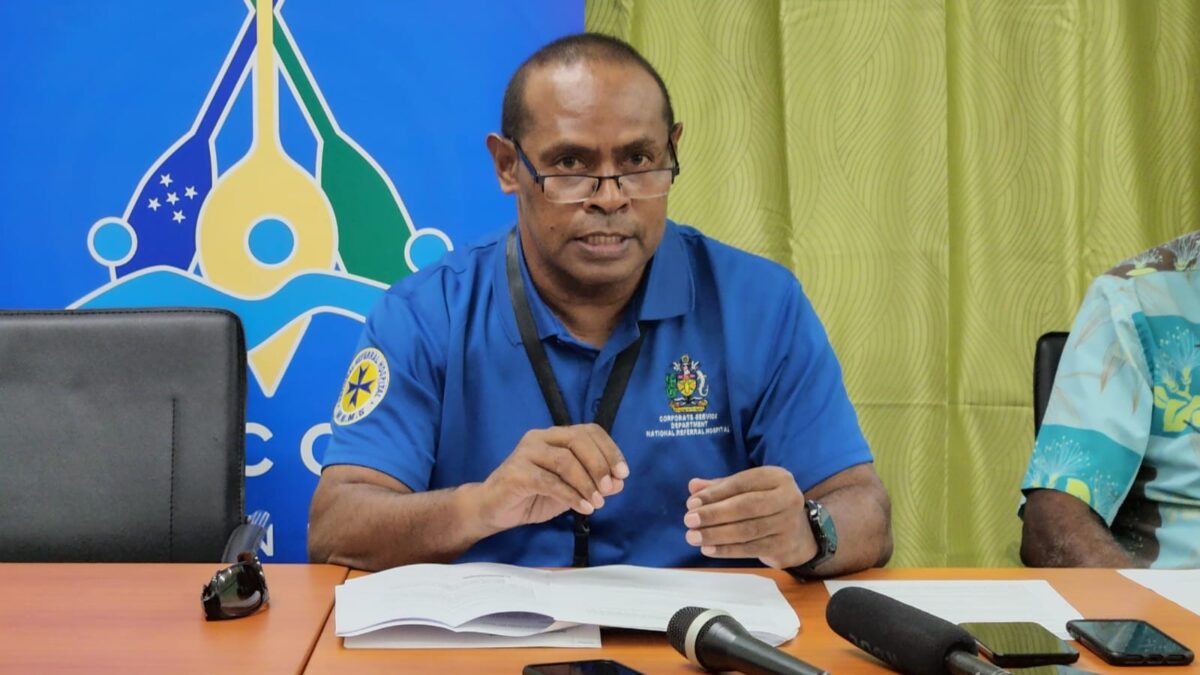

Dr George Malefoasi, NRH Chief Executive Officer at the PMO Press Conference
Cancer screening is already ongoing: the early it is detected the better the chances for survival, says NRH CEO.
Responding to media enquiries at the weekly Prime Minister Office Press Conference, Friday last week, on when the Ministry will commence screening programme for early signs of breast, cervical and prostate cancer, Dr George Malefoasi Chief Executive Officer of the National Referral Hospital (NRH) said that cancer screening is already happening.
Dr George Malefoasi, NRH Chief Executive Officer at the PMO Press Conference
Dr Malefoasi said that cancer screening is ongoing as part of public health programs in clinics and hospitals. “Basically, such screening is done by physical examination which including self-examinations, direct visual examinations, which are aided by diagnostic confirmation tests.
“These tests are available at the clinics and the hospitals. These diagnostic confirmation test involves blood markers testing, medical imaging such as ultrasound, and pathology (histology) testing. These procedures duration can take at least 3 weeks for final decision, and expected to be longer due to uncontrolled circumstances. Histology samples are also sent overseas to advanced medical laboratory for analysis to quality validation and confirm presence of cancer”, explained Dr Malefoasi.
He said in general terms of basic treatment, surgical, chemotherapy and hormonal therapy are available at NRH except for radio therapy.
His emphasize not only to rely on NRH but seek nurses and doctors at the clinics including the private practitioners for regular check-ups for both women and men. There are trained doctors and nurses who can do breast, cervical and prostate cancer screening in our clinics and hospitals in Honiara and provinces.
He stressed that having additional modern equipment for breast screening is additional value such as a mammogram, which is in the process of being procured with support of a partner.
Dr Malefoasi highlighted that with cancer the early it is detected the better the chances of survival from these various treatment regimes. Early detection will also help with counselling to prepare for any treatment and care management planned should the results return positive for cancer.
“Therefore, for women and girls it is important to regularly examination for lumps in breast that are often painless, by pressing fingers against and around the breast to feel for any lumps or boils. Should you detect any small lumps that is painless, it is critical that you quickly see a doctor for confirmation through examination and tests”,
“Additionally, for women and girls, should they see irregular discharge of blood or mass bleeding that is not normal, it is advisable to consult doctor as it can be caused by cervical cancer. However, reaching such stage of irregular or heavy bleeding can be indicative of cancer spread already thus it is crucial that regular checks even without any bleeding is done for early detection of presence of cancer”, said Dr Malefoasi.
He said for prostate cancer, if men see blood in urine or, find it difficult to pass urine, it could be because of the enlargement of the prostrate due to benign or more aggressive type cancer therefore the early it is examined by the doctor the better it is to either rule out cancer or proceed to appropriate treatment.
“Otherwise nothing much can be done if it spread to other organs and parts of the body. The detection of prostate enlargement is done by a rectal examination by the doctor with a blood marker testing. The surgery to remove the cancer prostrate can be done by our local surgeon doctors”, said Dr. Malefoasi.
Breast and cervical cancer screening are part of reproductive health services at the clinics including youth centres (SIPPA and all public and private clinics). Breast and prostate cancers screening and treatment and management of care are dealt with by the hospital surgical and medical oncology (cancer) teams. Cervical cancer screening and treatment is dealt by Gynaecology and oncology teams at the hospital.
Prostate cancer screening is also done in the clinics, private practitioners and at the hospital. By clinical examination, i.e. rectal examination. For suspected cases blood test PSA is sent overseas, and definitive diagnosis by prostate biopsy for histology.
Important point to take note of is that all cancer screening programs are available and ongoing in the clinics and hospitals in the country. Please do regular check-ups.
-MHMS Press